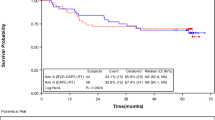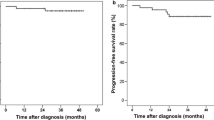Abstract
Purpose
To assess safety and activity of neoadjuvant bevacizumab, capecitabine and standard radiotherapy in locally advanced rectal cancer as well as potential predictive biomarkers.
Patients and methods
The multicentric phase II study enrolled 43 patients who received bevacizumab infusion (5 mg/kg) every 2 weeks for 4 cycles; oral capecitabine at 825 mg/m2 twice a day for 5.5 weeks with external–beam irradiation (50.4 Gy in 28 fractions over 5.5 weeks). We determined certain biomarkers before and after therapy for correlation with response.
Results
Post-operative histologic examination revealed no residual cancer cells in 6 of the 43 patients (14%; 95% confidence limits 3.60–24.31%). In another 22 patients (51.2%) a varying percentage of cancer cells in residual areas of fibrosis/ necrosis was found, corresponding to Mandard TRG 2 or 3 classification. Tumor resection with negative circumferential margin was achieved in 38/40 (95%) operated patients. Sphincter–sparing surgery was obtained in 31 (72.1%) patients. Primary tumor and lymph nodes downstaging was observed in 15 (34.9%) and 16 (37.2%) cases, respectively. Neoadjuvant therapy was safe and well tolerated. The most frequent side effects were G1-2 diarrhea, proctitis, rectal bleeding and hypertension. No biomarker tested was significantly predictive of both pathological complete response and disease-free survival. Pre-treatment CD-34 vessel density, post-treatment Ki-67 labeling index and VEGFR-2 cancer cells expression significantly correlated with residual tumor area.
Conclusions
The schedule of neoadjuvant therapy tested was safe and active. Pre-treatment vessel density by the panendothelial marker anti CD-34 antibody, post-treatment Ki-67 labeling index and VEGFR-2 expression were significantly associated to residual tumor area. The biomarkers correlations warrant further evaluation in prospective clinical trials.




Similar content being viewed by others
References
Cammà C, Giunta M, Fiorica F, Pagliaro L, Craxì A, Cottone M (2000) Preoperative radiotherapy for resectable rectal cancer: a meta-analysis. JAMA 284:1008–1015
Colorectal Cancer Collaborative Group (2001) Adjuvant radiotherapy for rectal cancer: a systematic overview of 8, 507 patients from 22 randomised trials. Lancet 358:1291–1304
Bosset JF, Colette L, Calais G, Mineur L, Maingon P, Radosevic-Jelic L et al (2006) Chemotherapy with preoperative radiotherapy in rectal cancer. N Engl J Med 355:1114–1123
Gerard JP, Conroy T, Bonnetain F, Bouché O, Chapet O, Closon-Dejardin MT et al (2006) Preoperative radiotherapy, with or without concurrent 5fluorouracil and leucovorin in T3–T4 rectal cancers: results of the FFCD 9203 trial. J Clin Oncol 24:4620–4625
Roh MS, Colangelo LH, O’Connell MJ, Yothers G, Deutsch M, Allegra CJ et al (2009) Preoperative multimodality therapy improves disease-free survival in patients with carcinoma of the rectum: NSABP R-03. J Clin Oncol 27:5124–5130
Sawada N, Ishikawa T, Sekiguchi F, Tanaka Y, Ishitsuka H (1999) X-ray irradiation induces thymidine phosphorylase and enhances the efficacy of capecitabine (xeloda) in human cancer xenografts. Clin Cancer Res 5:2948–2953
Ben-Josef E (2007) Capecitabine and radiotherapy as neoadjuvant treatment for rectal cancer. Am J Clin Oncol 30:649–655
Cividalli A, Ceciarelli F, Livdi E, Altavista P, Cruciani G, Marchetti P et al (2002) Radiosensitization by oxaliplatin in a mouse adenocarcinoma: influence of treatment schedule. Int J Radiat Oncol Biol Phys 52:1092–1098
Gérard JP, Azria D, Gourgou-Bourgade S, Martel-Laffay I, Hennequin C, Etienne PL et al (2010) Comparison of two neoadjuvant chemoradiotherapy regimens for locally advanced rectal cancer: results of the phase III trial ACCORD 12/0405-Prodige 2. J Clin Oncol 28:1638–1644
Aschele C, Cionini L, Lonardi S, Pinto C, Cordio S, Rosati S et al (2011) Primary tumor response to preoperative chemoradiation with or without oxaliplatin in locally advanced rectal cancer: pathologic results of the STAR-01 randomized Phase III trial. J Clin Oncol 29:2773–2780
Weiser MR (2011) Rectal cancer trials: no movement. J Clin Oncol 29:2746–2748
Debucquoy A, Machiels JP, McBride WH, Haustermans K (2010) Integration of epidermal growth factor receptor inhibitors with preoperative chemoradiation. Clin Cancer Res 16:2709–2714
Rödel C, Arnold D, Hipp M, Liersch T, Dellas K, Iesalnieks I et al (2008) Phase I-II trial of cetuximab, capecitabine, oxaliplatin, and radiotherapy as preoperative treatment in rectal cancer. Int J Radiat Oncol Biol Phys 70:1081–1086
Hurwitz HI, Fehrenbacher L, Hainsworth JD, Heim W, Berlin J, Holmgren E et al (2005) Bevacizumab in combination with fluorouracil and leucovorin: an active regimen for first-line metastatic colorectal cancer. J Clin Oncol 23:3502–3508
Allegra CJ, Yothers G, O’Connell MJ, Sharif S, Petrelli NJ, Colangelo LH et al (2011) Phase III trial assessing bevacizumab in stages II and III carcinoma of the colon: results of NSABP protocol C-08. J Clin Oncol 29:11–16
De Gramont A, Van Cutsem E, Tabernero J, Moore MJ, Cunningham D, Rivera F et al (2011) AVANT: results from a randomized, three-arm multinational phase III study to investigate bevacizumab with either XELOX or FOLFOX4 versus FOLFOX4 alone as adjuvant treatment for colon cancer. J Clin Oncol 29(suppl 4); abstr 362
Willett CG, Kozin SV, Duda DG, di Tomaso E, Kozak KR, Boucher Y et al (2006) Combined vascular endothelial growth factor-targeted therapy and radiotherapy for rectal cancer: theory and clinical practice. Semin Oncol 33(Suppl 10):S35–S40
Willett CG, Boucher Y, di Tomaso E, Duda DG, Munn LL, Tong RT et al (2004) Direct evidence that the VEGF-specific antibody bevacizumab has antivascular effects in human rectal cancer. Nat Med 10:145–147
Willett CG, Duda DG, di Tomaso E, Boucher Y, Ancukiewicz M, Sahani DV et al (2009) Efficacy, safety, and biomarkers of neoadjuvant bevacizumab, radiation therapy, and fluorouracil in rectal cancer: a multidisciplinary phase II study. J Clin Oncol 27:3020–3026
Mandard AM, Dalibard F, Mandard JC, Marnay J, Henry-Amar M, Petiot JF et al (1994) Pathologic assessment of tumor regression after preoperative chemoradiotherapy of esophageal carcinoma. Clinicopathologic correlations. Cancer 73:2680–2686
Velenik V, Ocvirk J, Music M, Bracko M, Anderluh F, Oblak I et al (2011) Neoadjuvant capecitabine, radiotherapy, and bevacizumab (CRAB) in locally advanced rectal cancer: results of an open-label phase II study. Radiat Oncol 6:105–112
Crane CH, Eng C, Feig BW, Das P, Skibber JM, Chang GJ et al (2010) Phase II trial of neoadjuvant bevacizumab, capecitabine, and radiotherapy for locally advanced rectal cancer. Int J Radiat Oncol Biol Phys 76:824–830
Czito BG, Bendell JC, Willett CG, Morse MA, Blobe GC, Tyler DS et al (2007) Bevacizumab, oxaliplatin, and capecitabine with radiation therapy in rectal cancer: phase I trial results. Int J Radiat Oncol Biol Phys 68:472–478
Kennecke H, Berry S, Wong R, Zhou C, Tankel K, Easaw J et al (2011) Pre-operative bevacizumab, capecitabine, oxaliplatin and radiation among patients with locally advanced or low rectal cancer: a phase II trial. Eur J Cancer (in press)
Nogué M, Salud A, Vicente P, Arriví A, Roca JM, Losa F et al (2011) Addition of bevacizumab to XELOX induction therapy plus concomitant capecitabine-based chemoradiotherapy in magnetic resonance imaging-defined poor-prognosis locally advanced rectal cancer: the AVACROSS study. Oncologist 16:614–620
Kuzu I, Bicknell R, Harris AL, Jones M, Gatter KC, Mason DY (1992) Heterogeneity of vascular endothelial cells with relevance to diagnosis of vascular tumours. J Clin Pathol 45:143–148
Sauter B, Foedinger D, Sterniczky B, Wolff K, Rappersberger K (1998) Immunoelectron microscopic characterization of human dermal lymphatic microvascular endothelial cells. Differential expression of CD31, CD34, and type IV collagen with lymphatic endothelial cells versus blood capillary endothelial cells in normal human skin, lymphangioma, and hemangioma in situ. J Histochem Cytochem 46:165–176
Miettinen M, Lindenmayer AE, Chaubal A (1994) Endothelial cell markers CD31, CD34, and BNH9 antibody to H- and Y-antigens—evaluation of their specificity and sensitivity in the diagnosis of vascular tumors and comparison with von Willebrand factor. Mod Pathol 7:82–90
Jakob C, Liersch T, Meyer W, Becker H, Baretton GB, Aust DE (2008) Predictive value of Ki67 and p53 in locally advanced rectal cancer: correlation with thymidylate synthase and histopathological tumor regression after neoadjuvant 5-FU-based chemoradiotherapy. World J Gastroenterol 14:1060–1066
Zlobec I, Vuong T, Compton CC, Lugli A, Michel RP, Hayashi S et al (2008) Combined analysis of VEGF and EGFR predicts complete tumour response in rectal cancer treated with preoperative radiotherapy. Br J Cancer 98:450–456
Jinushi M, Chiba S, Yoshiyama H, Masutomi K, Kinoshita I, Dosaka-Akita H et al (2011) Tumor-associated macrophages regulate tumorigenicity and anticancer drug responses of cancer stem/initiating cells. Proc Natl Acad Sci USA 108:12425–12430
Steidl C, Lee T, Shah SP, Farinha P, Han G, Nayar T et al (2010) Tumor-associated macrophages and survival in classic Hodgkin’s lymphoma. N Engl J Med 362:875–885
Bingle L, Brown NJ, Lewis CE (2002) The role of tumour-associated macrophages in tumour progression: implications for new anticancer therapies. J Pathol 196:254–265
Kocakova I, Svoboda M, Kubosova K, Chrenko V, Roubalova E, Krejci E et al (2007) Preoperative radiotherapy and concomitant capecitabine treatment induce thymidylate synthase and thymidine phosphorylase mRNAs in rectal carcinoma. Neoplasma 54:447–453
Boskos CS, Liacos C, Korkolis D, Aygerinos K, Lamproglou I, Terpos E et al (2010) Thymidine phosphorylase to dihydropyrimidine dehydrogenase ratio as a predictive factor of response to preoperative chemoradiation with capecitabine in patients with advanced rectal cancer. J Surg Oncol 102:408–412
Zhang D, Hedlund E, Lim S, Chen F, Zhang Y, Sun B et al (2011) Antiangiogenic agents significantly improve survival in tumor-bearing mice by increasing tolerance to chemotherapy-induced toxicity. Proc Natl Acad Sci USA 108:4117–4122
Acknowledgments
The study was supported in part by Roche S.p.A., Italy. We are indebted to the following investigators who participated in the study: Monica Lencioni, Oncologia Medica Ospedale S. Chiara, Pisa; Roberto Murialdo, Dipartimento Medicina Interna Università di Genova; Cristina Granetto, Oncologia Medica, Ospedale S. Croce & Carle, Cuneo; Angelo Martignetti, Dipartimento Oncologia AUSL7, Siena.
Author information
Authors and Affiliations
Corresponding author
Rights and permissions
About this article
Cite this article
Gasparini, G., Torino, F., Ueno, T. et al. A phase II study of neoadjuvant bevacizumab plus capecitabine and concomitant radiotherapy in patients with locally advanced rectal cancer. Angiogenesis 15, 141–150 (2012). https://doi.org/10.1007/s10456-011-9250-0
Received:
Accepted:
Published:
Issue Date:
DOI: https://doi.org/10.1007/s10456-011-9250-0




